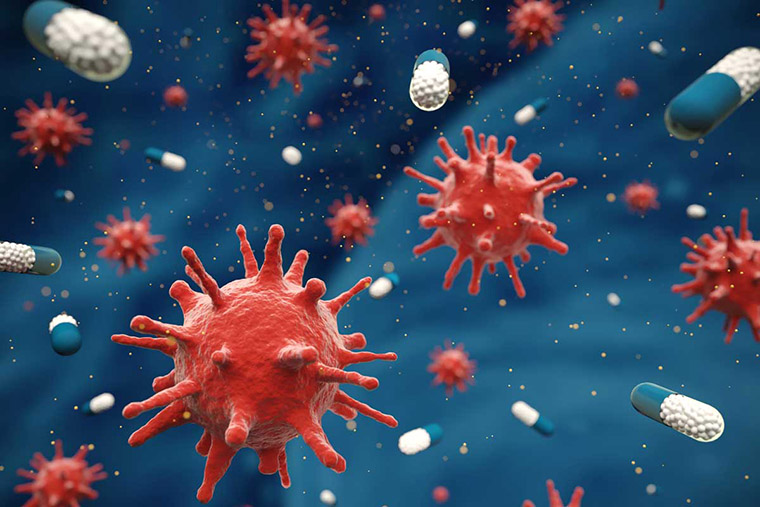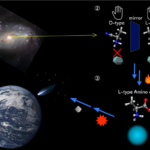ウイルスの重篤な合併症を予防する薬剤を推奨 Drug recommended to prevent severe complications of virus
2023-03-23 ワシントン大学セントルイス校
 People infected with COVID-19 who then took the antiviral medication Paxlovid within five days after testing positive experienced a reduced risk of long-term health problems, hospitalization and death for up to six months, according to a study by researchers at Washington University School of Medicine in St. Louis and the Veterans Affairs St. Louis Health Care system. (Image: Getty Images)
People infected with COVID-19 who then took the antiviral medication Paxlovid within five days after testing positive experienced a reduced risk of long-term health problems, hospitalization and death for up to six months, according to a study by researchers at Washington University School of Medicine in St. Louis and the Veterans Affairs St. Louis Health Care system. (Image: Getty Images)
Paxlovidは、COVID-19を引き起こすウイルスの増殖を止め、体内のウイルス量を減らす作用があります。
ファイザーが開発したパクスロビッドは、ニルマトレルビルとリトナビルを含む経口抗ウイルス薬のブランド名です。2021年後半、米国食品医薬品局は緊急使用許可を発行し、重度のCOVID-19に進行するリスクのある人々の軽度から中等度のCOVID-19を治療するために薬を処方することを許可しました。
この薬剤の効果は感染後6か月間持続し、ワクチン未接種者、接種者、追加のブースターショットを接種した人々、COVID-19から回復した後に1回以上再感染された人々にも及びます。この研究結果は、JAMA Internal Medicine誌に掲載されています。
<関連情報>
- https://source.wustl.edu/2023/03/paxlovid-reduces-risk-of-long-term-health-problems-death-from-covid-19/
- https://medicine.wustl.edu/news/paxlovid-reduces-risk-of-long-term-health-problems-death-from-covid-19/
- https://jamanetwork.com/journals/jamainternalmedicine/fullarticle/2802878
ニルマトルビルによる治療とCOVID-19後遺症のリスクとの関連について Association of Treatment With Nirmatrelvir and the Risk of Post–COVID-19 Condition
Yan Xie, Taeyoung Choi, Ziyad Al-Aly
JAMA Internal Medicine Published:March 23, 2023
DOI :10.1001/jamainternmed.2023.0743
Key Points
Question Is treatment with nirmatrelvir in the acute phase of SARS-CoV-2 infection associated with a lower risk of post–COVID-19 condition (PCC)?
Findings In this cohort study of 281 793 people with SARS-CoV-2 infection who had at least 1 risk factor for progression to severe COVID-19 illness, compared with 246 076 who had no treatment, nirmatrelvir use in the acute phase (n = 35 717) was associated with reduced risk of PCC, including reduced risk of 10 of 13 post–acute sequelae in various organ systems, as well as reduced risk of post–acute death and post–acute hospitalization. Nirmatrelvir was associated with reduced risk of PCC in people who were unvaccinated, vaccinated, and boosted, and in people with primary SARS-CoV-2 infection and reinfection.
Meaning In people with SARS-CoV-2 infection and at least 1 risk factor for progression to severe COVID-19 illness, treatment with nirmatrelvir during the acute phase of COVID-19 was associated with reduced risk of PCC.
Abstract
Importance Post–COVID-19 condition (PCC), also known as long COVID, affects many individuals. Prevention of PCC is an urgent public health priority.
Objective To examine whether treatment with nirmatrelvir in the acute phase of COVID-19 is associated with reduced risk of PCC.
Design, Setting, and Participants This cohort study used the health care databases of the US Department of Veterans Affairs (VA) to identify patients who had a SARS-CoV-2 positive test result between January 3, 2022, and December 31, 2022, who were not hospitalized on the day of the positive test result, who had at least 1 risk factor for progression to severe COVID-19 illness, and who had survived the first 30 days after SARS-CoV-2 diagnosis. Those who were treated with oral nirmatrelvir within 5 days after the positive test (n = 35 717) and those who received no COVID-19 antiviral or antibody treatment during the acute phase of SARS-CoV-2 infection (control group, n = 246 076) were identified.
Exposures Treatment with nirmatrelvir or receipt of no COVID-19 antiviral or antibody treatment based on prescription records.
Main Outcomes and Measures Inverse probability weighted survival models were used to estimate the association of nirmatrelvir (vs control) with post–acute death, post–acute hospitalization, and a prespecified panel of 13 post–acute COVID-19 sequelae (components of PCC) and reported in relative scale as relative risk (RR) or hazard ratio (HR) and in absolute scale as absolute risk reduction in percentage at 180 days (ARR).
Results A total of 281 793 patients (mean [SD] age, 61.99 [14.96]; 242 383 [86.01%] male) who had a positive SARS-CoV-2 test result and had at least 1 risk factor for progression to severe COVID-19 illness were studied. Among them, 246 076 received no COVID-19 antiviral or antibody treatment during the acute phase of SARS-CoV-2 infection, and 35 717 received oral nirmatrelvir within 5 days after the positive SARS-CoV-2 test result. Compared with the control group, nirmatrelvir was associated with reduced risk of PCC (RR, 0.74; 95% CI, 0.72-0.77; ARR, 4.51%; 95% CI, 4.01-4.99), including reduced risk of 10 of 13 post–acute sequelae (components of PCC) in the cardiovascular system (dysrhythmia and ischemic heart disease), coagulation and hematologic disorders (pulmonary embolism and deep vein thrombosis), fatigue and malaise, acute kidney disease, muscle pain, neurologic system (neurocognitive impairment and dysautonomia), and shortness of breath. Nirmatrelvir was also associated with reduced risk of post–acute death (HR, 0.53; 95% CI, 0.46-0.61); ARR, 0.65%; 95% CI, 0.54-0.77), and post–acute hospitalization (HR, 0.76; 95% CI, 0.73-0.80; ARR, 1.72%; 95% CI, 1.42-2.01). Nirmatrelvir was associated with reduced risk of PCC in people who were unvaccinated, vaccinated, and boosted, and in people with primary SARS-CoV-2 infection and reinfection.
Conclusions and Relevance This cohort study found that in people with SARS-CoV-2 infection who had at least 1 risk factor for progression to severe disease, treatment with nirmatrelvir within 5 days of a positive SARS-CoV-2 test result was associated with reduced risk of PCC across the risk spectrum in this cohort and regardless of vaccination status and history of prior infection; the totality of findings suggests that treatment with nirmatrelvir during the acute phase of COVID-19 may reduce the risk of post–acute adverse health outcomes.

